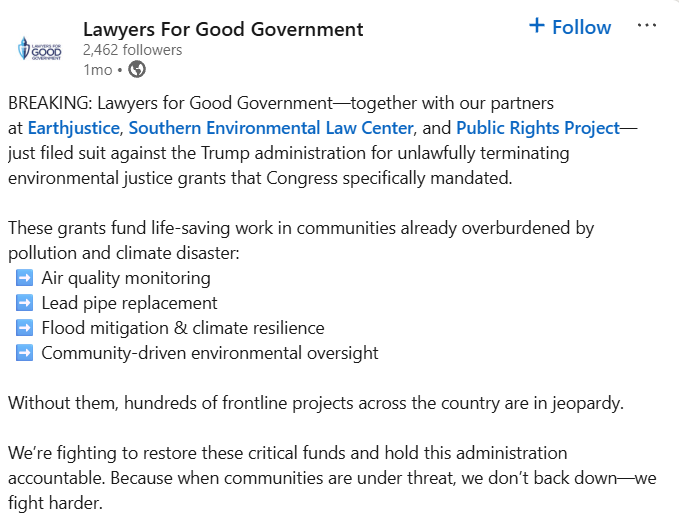Need Some Good News?
Here's how the fight to Save Lives, Save EPA is gaining momentum
[A quick note to say thank you for continuing to read and share these posts. Symons Says is now within a stone’s throw of 3,000 subscribers. Please spread the word, because this Substack is free and my throwing aim is lousy.]
Three months ago, I wrote a post that laid out how Trump’s political team at EPA, led by Administrator Lee Zeldin, would dismantle EPA and turn the keys to safeguarding the air we breathe and the water we drink over to polluter lobbyists. Witnessing the predictions come to life day after day has been depressing, to say the least.
In fact, the incessant drumbeat of bad news continues today as Zeldin unveils his latest Orwellian scheme: repealing the bedrock scientific finding that greenhouse-gas emissions endanger human life and wellbeing.
Speaking today on “Ruthless,” a podcast licensed by FoxNews, Lee Zeldin previewed his rollback as a “driving a dagger into the heart of the climate change religion” and chided the scientific consensus that carbon pollution is driving climate change:
“They'll never acknowledge any type of benefit or need for carbon dioxide… It's important to note, and they don't, how important it is for the planet…. the left, their minds will explode.” —
[For a more reasoned historical perspective, look at this 2007 letter to President George W. Bush from his EPA Administrator, Steven Johnson (a scientist), who wrote that climate change science requires an affirmative finding that it endangers the public].
With this constant toxic drip, it is easy to lose sight of good news. Which is why I wanted to share three encouraging developments that you might not be aware of.
U.S. Senate to Zeldin: WTF?
On Thursday, the Senate Appropriations Committee issued a sharp rebuke to Zeldin. Not just Democrats. The 26-2 vote in favor of EPA’s appropriations deal included “ayes” from 13 of the committee’s 15 Republicans, including coal-state Senators Mitch McConnell of Kentucky and Shelly Moore Capito of West Virginia. The rational and bipartisan appropriations deal was brokered by Democratic Senators Jeff Merkley and Patty Murray together with Republican Senators Lisa Murkowski and Susan Collins.
The deal includes a scathing critique of Zeldin’s moves to unilaterally shut down EPA’s science office and fire hundreds of experienced scientists:
The Committee is appalled that the Agency has announced the imminent closure of [EPA’s Office of Research and Development], which would result in the further loss of biologists, chemists, engineers, ecologists, and other expert scientists numbering in the thousands and the closure of world-class laboratories and research centers. The Agency has touted savings of $748,800,000 in direct Federal spending, but fails to acknowledge the immeasurable risk to our health and environment that would come from undermining EPA’s ability to clean up hazardous chemicals, respond to disasters, and support states and Tribal Nations with sound, actionable science. …The Committee directs the Agency to immediately halt all actions related to the closure, reduction, reorganization, or other similar such changes to ORD and the EPA scientific workforce… [emphasis added]
In addition to standing up for EPA’s science office, the Senate bill funds other parts of EPA that Zeldin is attempting to raze to the ground, including EPA’s main climate office (the Office of Atmospheric Programs), all environmental justice programs and staff, and the Energy Star programs that have saved American families and businesses more than $500 billion on energy bills.
The bipartisan Senate deal, which would cut EPA’s budget by 5%, is also a repudiation of Trump’s reckless proposal to cut EPA’s budget by more than half.
In one notable area, Senate appropriators decided to cut deeper than the spending plan put forward by Trump and Zeldin: Senators are deeply cutting the budget for the Offices of the EPA Administrator. According to the Senate report language, which accompanies the appropriations bill and provides further direction to agencies:
The Committee is frustrated with how EPA has decided to not have a working relationship with the Committee and to disregard Congressional directives related to staffing and funding. The Committee will consider targeted increases to funding for the Offices if the Offices can demonstrate that it takes its relationship with the Committee seriously.
No allowance for you, kiddo, until you read the Constitution. Here, we underlined the part about Congress having the power of the purse.
The path forward is uncertain. With such a strong bipartisan vote out of committee, the bill and accompanying report should readily pass the Senate. However, Trump’s budget-thug-in-chief, Russ Vought, would prefer to ignore the Senate altogether, recently telling reporters:
“The appropriations process has to be less bipartisan.”
Well, too bad. Unlike the big budget bill and the rescission bill that reached Trump’s desk after holdout Republicans caved, any FY 2026 spending deals require 60 votes in the Senate, which means they need bipartisan support.
The contours of the EPA spending deal are clear: Democrats are willing to support modest cuts in spending levels for EPA in exchange for bipartisan support to reign in Zeldin’s reckless efforts to gut the agency.
However this process unfolds, one thing is clear: Zeldin’s profound arrogance has finally roused the Senate from its Trump-induced coma. And for the more than 10,000 public servants at EPA who are going to work each day trying their best to do the job, the Senate just sent their strongest signal yet that Zeldin’s unbridled reign of terror at EPA may not last forever.
Asbestos Blow Back
Another sign that Zeldin’s rampage through EPA is wearing thin: EPA recently had to backtrack on one of its regulatory rollbacks after a public backlash.
Last month, EPA’s Lynn Ann Dekleva — recently arrived from the American Chemistry Council, the chemical industry’s trade association — said that EPA would delay and weaken a Biden-era rule banning asbestos products that are still imported and used in the United States. These asbestos products are banned in more than 50 countries because asbestos causes lung cancer and mesothelioma.
While Zeldin prides himself on being the top show dog at the Deregulation Kennel Club, he wasn’t prepared for the reaction when the public got wind of what was happening.
As reported widely at the time, including by Fox News Live, Trump’s EPA was once again putting polluter interests ahead of public health.
When EPA backtracked, the AP carried the news to outlets throughout the country, giving the Environmental Protection Network the final word (as the chemical lobby sulked):
“This is just the beginning of the public backlash against the Trump administration’s plans to roll back 31 standards that protect the air we breathe and the water we drink,” said Michelle Roos, executive director of the Environmental Protection Network. “Public health is not up for negotiation.”
The American Chemistry Council trade group declined to comment.
Seeking Justice
During Trump’s First term, EPA lost a record number of court cases as their early moves fell one after the other. Zeldin seems intent on breaking the record, letting sound bites from his Fox News appearances guide the agency rather than carefully following the Clean Air Act, the Clean Water Act, and other environmental laws that specify EPA’s clear role in protecting public health and the environment.
Zeldin has been particularly vocal about shutting down anything related to environmental justice. From rural to fenceline communities, environmental justice grants and programs steer resources where they are needed most, offering support for everyone who lives, works, and plays in areas that face especially high environmental risks.
Recently, a coalition of 350 nonprofits, Tribes and local governments sued the Trump administration for unlawfully terminating EPA’s Environmental and Climate Justice Grant programs.
These community-based grants are specifically mandated by a 2022 law. They help communities prepare for climate disasters such as flash floods, monitor air quality, and improve community participation in decisions that impact their health.
This case isn’t just about restoring grant funding in a handful of places — it’s about restoring critical services and projects in areas of the country with the greatest need.
— Jon Miller, Chief Program Officer, Public Rights Project
The courts have yet to weigh in, but the coalition fighting back is growing stronger every day.
Save Lives, Save EPA
The stakes moving forward couldn’t be higher. Zeldin still has his sights on rollbacks that, as documented by an in-depth AP analysis, will lead to hundreds of thousands of deaths if he gets his way.
But Zeldin’s arrogance has opened up vulnerabilities that can be pursued in the court of law, the court of public opinion, and Congress. His walls are beginning to crack. That provides momentum and hope we must build on in order to Save Lives, Save EPA.



